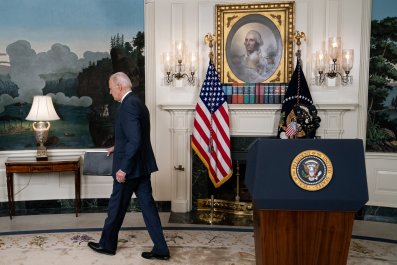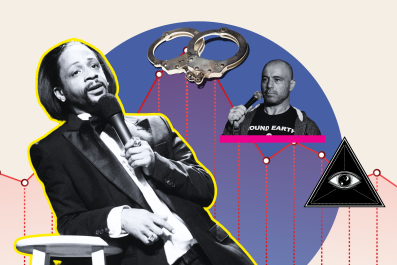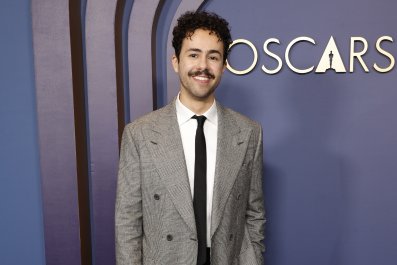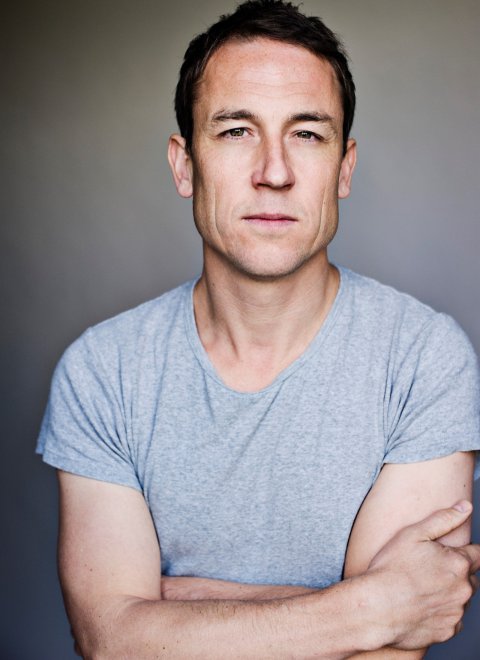
"It felt like a really interesting story to be telling in this moment, because it speaks to how fragile democracies can be."
How much do we really know about the assassination of President Abraham Lincoln? That's a question Tobias Menzies hopes to answer in Apple TV+'s Manhunt. "The thing that really struck me was the newness of the nation, that it wasn't really all knitted together properly, it was still so raw." Menzies plays Edwin Stanton, the U.S. Secretary of War under Lincoln, as he leads the manhunt for John Wilkes Booth. As a Brit, Menzies says "it's not without its trepidation to take on these important figures in your country's history," but that he hopes "to bring enough insight, and maybe some of that is about being an outsider." The show, which leans "toward the conspiracy political, crime thriller sort of genre," is also surprisingly timely. "The political and physical reality of the United States is a sort of a given now. It was interesting putting ourselves back into a world where that's not a given...and the danger is that the tide will significantly turn in a different direction if [Stanton] isn't able to resist the forces that have committed that deed."
SUBSCRIBE TO THE PARTING SHOT WITH H. ALAN SCOTT
ON APPLE PODCASTS OR SPOTIFY
Editor's Note: This conversation has been edited and condensed for publication.
What about this project appealed to you?
Obviously, I'm not American, so it's not part of my country's history. I think what drew me to it was it's a compelling story and one that I didn't know a huge amount about. And I feel like this may be true for quite a lot of viewers. I knew that Lincoln had been killed in a theater, but that was about as far as my knowledge went. And then the complexity of that event. For example, the fact that it happened days after the end of the Civil War, and the result of that [brought the] war into question, how long it took to find John Wilkes Booth and his conspirators, and, in a way, the fact that it spoke to a country that was still completely livid, and all those ingredients, were very fresh to me. It felt like a really interesting story to be telling in this moment, because it speaks to how fragile democracies can be and how they can turn on individuals and very specific moments. The killing of Lincoln and what was lost through that assassination is a big part of the story that we're trying to tell in this show. It felt a really rich area to be digging in.
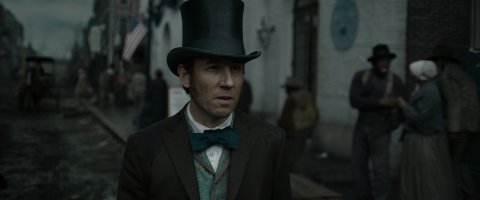
So much of this story is part of history curriculums in the United States. Do you remember it ever being part of your education?
No, not really. I was never taught it at school. It was a big part of why Monica [Beletsky, creator/showrunner] wanted to make it, and I felt strongly about it, too. There's a lot of lessons to be learned from this story. It's hard to escape the feeling that there are resonances that are really important. It's looking like you're gonna have [Donald] Trump on the ticket again and you've gone through quite a turbulent few years in terms of again the strength of or fragility of democracies and these are crisis moments in countries' histories. I think you can learn a lot by looking at precedent. The loss of that one man, the loss of Lincoln, at that moment, make the argument that the history of African American people in America would have been very different, could have been very different, if he lived another sort of five to 10 years. Obviously, it took another 100 years for the Civil Rights movement, voting rights and land rights, and those were all on the on the agenda in the immediate aftermath of the Civil War, had Lincoln lived. That's a very different history.
Many of the themes in this story certainly are relevant today, and making this show with the backdrop of everything happening politically certainly must have impacted the need to tell this story.
I think it was absolutely in everyone's mind. I know it was a big influence for Monica, she felt it was a very timely story to be telling. And I feel like a big reason why Apple was interested in making it because it's the "great man" theory of history, isn't it? That someone like Lincoln can make all the difference, whether they're dead or alive, does change history. And I think that's something that Stanton really feels in the story that he knows, both a friend has been lost, but also an important figure in his country's story has been lost. And the danger is that the tide will significantly turn in a different direction if he isn't able to resist the forces that have committed that deed.
I do think there's some value to a British person playing a part in a story about something so many Americans know so much about. It's almost as if you can bring fresh eyes to the story, like it's almost too personal for us.
Well, first of all, I want to thank you very much for saying that. I appreciate that. Because it's not without its trepidation to take on these important figures in your country's history. One of the things I hope will come out of this show is that [Stanton] will be given new consideration, because I think he's a very, very important historical figure. I felt a lot of responsibility. I hope that I'm able to bring enough insight and maybe some of that is about being an outsider. I can see it a little more clearly. But I really hope that through this show, [Stanton is] someone that people get interested in again, because he's a fascinating figure.
Was there anything new or surprising that stood out to you about this story?
I think the thing that really struck me was the newness of the nation, that it wasn't really all knitted together properly. But it was still so raw, and these men were carving this country out of the rock in a way. I guess now, America [has] been through like 100 years of incredible American dominance, it's such a powerful country in our world. To sort of go back to a story where that isn't the case, it's being birthed in some way. I was very moved by that. And therefore, that ties into the type of men that were doing that work, the intellectual kind of rigor of them, the energy levels, how much it took out of them. Both Lincoln and Stanton lost children. Stanton was not a well man. That's how hard it was, and how much was at stake. The political and physical reality of the United States is a sort of a given now. It was interesting putting ourselves back into a world where that's not a given. To tell the story of how some of that journey was made and who made that journey.
Stanton isn't necessarily multi-dimensional, which I'm sure would make it difficult to figure out how to portray him. How did you find Stanton?
It was a mixture of kind of intuition and a lot of reading. I ended up feeling he was a man who was not a naturally social animal, not someone you want to have dinner with, but someone you do want in your corner when it gets really rough and that has like a universal quality, kind of every man. But it feels like, in that way, a period piece, because you don't have many political figures like that, who will not bend their beliefs to anyone.
Also, this era is known for facial hair on men, but you were able to escape that. What led to that decision?
It was a kind of quite a scary decision to make. When people Google Stanton, the main image that comes up are these very whiskery photos of him. I just kind of intuited that that's gonna be very distracting, loads of extra hair to look at for seven hours. Structurally, in terms of story, I am the man that has to guide the audience through this complicated story. And so I just took the decision to clean that up.
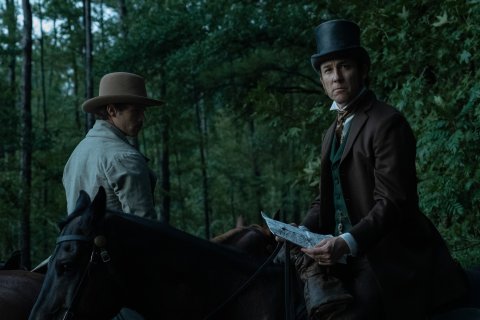
Well, it also helps keep attention on you, because Stanton needs to stand out, and in a sea of facial hair he does because he's clean-shaven.
Yeah, I think so. In that regard, I think we were leaning toward the conspiracy political, crime thriller sort of genre. And I think he did need to be the Humphrey Bogart of the story in a way that we can trust and we want by our side as we go through this rapidly changing and shifting sands of the story.
It's interesting you brought that up, because there is a true crime-meets-history element to the story and the feel of the show.
Absolutely. I very much think that's what Monica wanted to weave together was the larger political story of that time and the loss of Reconstruction, but with the kind of propulsive energy of a crime thriller. And so weave those two so that we can hopefully reach as wide an audience as possible. I'm actually remembering now, when I was working on it, a real touchstone for me actually was Atticus Finch. That kind of stoical figure that the story needs at the heart of it.
I always think about the balance between realism and imagination when I watch period dramas like this. I see it and I think, everyone must have been stinky, but I'm sure you weren't. [laughs]
It's a really good question. I suppose I would prioritize emotional, intellectual, moral truths of the story above the practical stuff. But if that's on offer, I think it can be really helpful. Certainly, as an actor, sometimes it's a luxury, you don't quite have enough time for it at moments because of the stringencies of a shoot. But we were very well supported in that regard by the production, it was a lot of detail in the props. And I think for other people it was a real passion project, that included all the different sort of props, teams and production teams and set design and all that. A lot of love was poured into that. So we were every day arriving at these sets and they were very rich, very detailed and gave us so much to sort of play against.
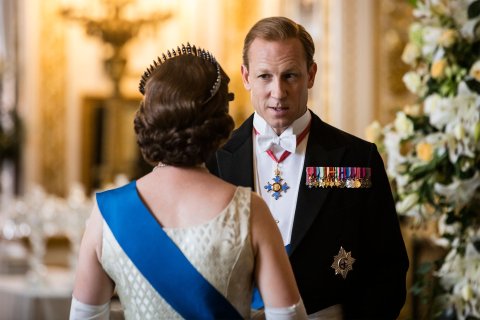
I'm curious about The Crown, because that's where a lot of people first saw you. What do you think The Crown will leave as a legacy?
I'm always wary to speak to the future. I think it's obviously had a very big cultural impact over the last sort of five or six years, and in a sort of sometimes not uncomplicated way. I think a lot of people have taken their history from that show. Obviously, it's not exactly history, it's a retelling. Peter Morgan's reimagining what happens in those rooms or behind those doors. But I think what Peter did very well was bring us emotionally close to that family, and also dig into a deep consideration of what is that institution? What is it to have a family and personal relationships within this very arcane structure? And I think that will probably last, because it's maybe the first drama to do that. It just goes, let's take this institution seriously and consider it. And that has been a good and fruitful contribution to the political debates.



